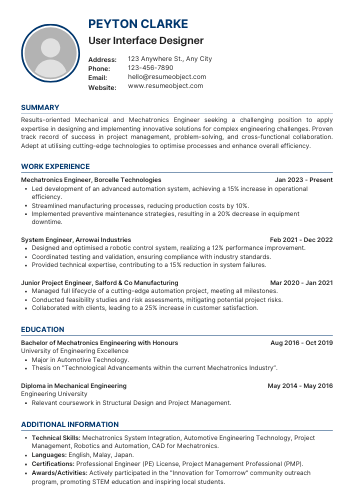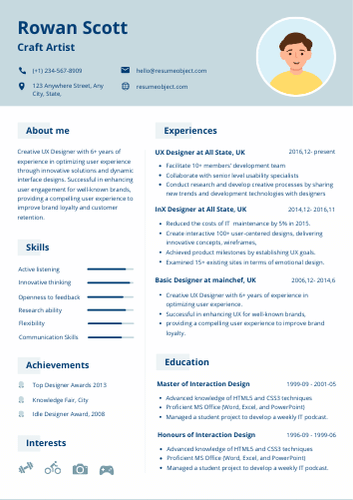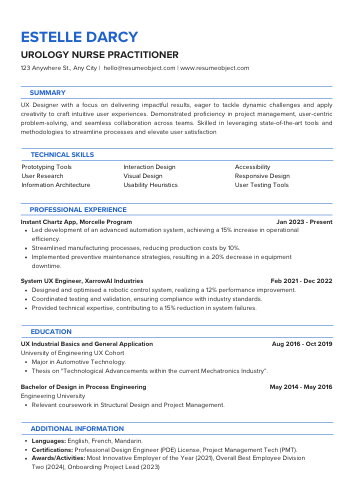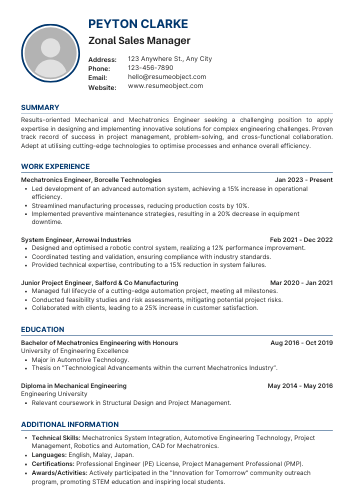Disaster Recovery Analyst Resume Template, Summary, Skills, Examples
Disaster Recovery Analyst Resume
In today's fast-paced business environment, a Disaster Recovery Analyst plays a crucial role in safeguarding an organization's data and infrastructure. Crafting an effective resume template is essential for showcasing your skills and experience in disaster recovery planning and risk management.
This article provides a comprehensive guide to creating a standout Disaster Recovery Analyst resume. With sample formats and expert tips, you will learn how to highlight your qualifications and attract potential employers in this vital field.
Disaster Recovery Analyst Resume Objective Statement Examples
Discover effective resume objective examples for Disaster Recovery Analysts, showcasing skills in risk assessment, recovery planning, and crisis management to attract potential employers and highlight your expertise in safeguarding business continuity.
-
Detail-oriented Disaster Recovery Analyst with a strong background in risk assessment and business continuity planning, seeking to leverage expertise in developing robust disaster recovery strategies to minimize downtime and ensure operational resilience.
-
Results-driven professional aiming to utilize analytical skills and technical knowledge in disaster recovery processes to enhance organizational preparedness and response capabilities for unforeseen events.
-
Motivated Disaster Recovery Analyst with experience in conducting thorough impact analyses and implementing recovery solutions, looking to contribute to a dynamic team focused on safeguarding critical business operations.
-
Proactive and strategic thinker with a passion for disaster recovery and business continuity, seeking to apply extensive knowledge of compliance standards and recovery frameworks to support organizational resilience initiatives.
-
Experienced Disaster Recovery Analyst dedicated to optimizing recovery plans and enhancing risk management strategies, aiming to drive continuous improvement in disaster recovery processes and ensure swift recovery in crisis situations.
For a compelling career in data management, enhance your job prospects with a standout resume. Discover tips and examples to craft yours effectively at Data Officer Resume.
Example Summary for Disaster Recovery Analyst Resume
A Disaster Recovery Analyst resume summary highlights expertise in risk assessment, recovery planning, and crisis management, showcasing skills that ensure organizational resilience and continuity in the face of disasters.
Detail-oriented and analytical recent graduate with a strong foundation in disaster recovery principles and risk management. Skilled in assessing vulnerabilities and developing strategic recovery plans to ensure business continuity. Proficient in data analysis and project management, with a passion for leveraging technology to enhance organizational resilience. Eager to contribute to a dynamic team and support effective disaster recovery initiatives.
Results-driven Disaster Recovery Analyst with over 5 years of experience in developing, implementing, and managing disaster recovery plans and business continuity strategies. Proficient in risk assessment, crisis management, and recovery testing, ensuring organizational resilience in the face of disruptions. Strong analytical skills combined with a proven ability to collaborate with cross-functional teams to identify vulnerabilities and enhance recovery processes. Committed to maintaining compliance with industry standards and improving operational efficiency through innovative solutions. Seeking to leverage expertise in a dynamic environment to safeguard critical business functions and minimize downtime.
Results-driven Disaster Recovery Analyst with over 10 years of experience in developing and implementing comprehensive disaster recovery and business continuity plans. Proven expertise in risk assessment, impact analysis, and recovery strategy formulation, ensuring organizational resilience and minimal downtime. Strong analytical skills combined with a deep understanding of IT infrastructure and cloud solutions. Adept at collaborating with cross-functional teams to conduct drills and training, fostering a culture of preparedness. Committed to enhancing recovery processes and ensuring regulatory compliance, with a track record of successfully managing recovery efforts during critical incidents. Seeking to leverage extensive experience to strengthen disaster recovery initiatives in a dynamic organization.
Similar Resumes
Key Job Duties & Responsibilities of Disaster Recovery Analyst
Disaster Recovery Analysts ensure organizational resilience by developing, implementing, and maintaining disaster recovery plans, conducting risk assessments, and coordinating recovery efforts to minimize downtime and safeguard critical operations.
-
Risk Assessment: Conduct thorough assessments to identify potential risks and vulnerabilities that could impact business operations.
-
Business Impact Analysis: Analyze critical business functions and determine the potential impact of disruptions on these operations.
-
Disaster Recovery Planning: Develop, implement, and maintain comprehensive disaster recovery plans that outline procedures for restoring operations after a disruption.
-
Testing and Drills: Organize and conduct regular testing of disaster recovery plans through simulations and drills to ensure effectiveness and readiness.
-
Documentation: Maintain accurate and up-to-date documentation of disaster recovery processes, policies, and procedures for easy reference.
-
Collaboration: Work closely with IT teams, management, and other stakeholders to ensure that disaster recovery strategies align with organizational goals.
-
Training and Awareness: Provide training to employees on disaster recovery procedures and promote awareness of the importance of preparedness.
-
Continuous Improvement: Regularly review and update disaster recovery plans based on changes in business operations, technology, and lessons learned from tests and actual events.
-
Compliance Monitoring: Ensure that disaster recovery plans comply with relevant regulations, standards, and best practices in the industry.
-
Crisis Management Support: Assist in the management of crises by coordinating response efforts and providing support during actual disaster events.
-
Reporting: Generate reports on disaster recovery readiness, test results, and improvement opportunities for management review.
-
Vendor Coordination: Liaise with third-party vendors and service providers to ensure their disaster recovery capabilities align with organizational needs.
Important Sections to Add in Disaster Recovery Analyst Resume
Highlighting key sections in a Disaster Recovery Analyst resume, such as relevant skills, certifications, professional experience, and project achievements, ensures a compelling presentation that showcases expertise and readiness to handle critical recovery situations effectively.
-
Contact Information: Include your full name, phone number, email address, and LinkedIn profile. Ensure that your contact details are up-to-date and professional.
-
Professional Summary: A brief overview highlighting your experience in disaster recovery, key skills, and what you bring to a potential employer. Tailor this section to reflect your career goals and expertise.
-
Core Competencies: List specific skills relevant to disaster recovery, such as risk assessment, business continuity planning, incident response, and data recovery techniques. This section should align with the job description.
-
Certifications: Highlight any relevant certifications such as Certified Business Continuity Professional (CBCP), Certified Information Systems Security Professional (CISSP), or ITIL certification. These credentials can set you apart from other candidates.
-
Professional Experience: Detail your work history, focusing on roles related to disaster recovery. Use bullet points to describe your responsibilities and achievements, emphasizing quantifiable results and successful projects.
-
Education: Include your highest degree, relevant coursework, and any additional training that supports your qualifications in disaster recovery. Mention the institution and graduation year.
-
Technical Skills: Specify tools and software you are proficient in, such as backup solutions, recovery tools, and project management software. This section demonstrates your technical expertise.
-
Projects: If applicable, mention significant projects you have managed or contributed to, detailing your role and the impact of the project on the organization’s disaster recovery capabilities.
-
Professional Affiliations: List any memberships in relevant organizations, such as the Disaster Recovery Institute International (DRII) or the Business Continuity Institute (BCI), to showcase your commitment to the field.
Required Skills for Disaster Recovery Analyst Resume
When crafting your Disaster Recovery Analyst resume, focus on showcasing your analytical thinking, problem-solving abilities, and technical expertise. Highlight your experience in risk assessment and crisis management to stand out to potential employers.
- Risk Assessment
- Business Impact Analysis
- Disaster Recovery Planning
- Incident Response Management
- Data Backup and Recovery
- Crisis Communication
- IT Infrastructure Knowledge
- Regulatory Compliance
- Technical Documentation
- Project Management
- Problem-Solving Skills
- Analytical Thinking
- Team Collaboration
- Continuous Improvement
- Training and Awareness Programs
Action Verbs to Use in Disaster Recovery Analyst Resume
Incorporating dynamic action verbs in your Disaster Recovery Analyst resume enhances clarity and impact, showcasing your skills and achievements effectively. These powerful words convey your proactive approach and expertise in managing and mitigating disaster recovery processes.
- Analyzed
- Coordinated
- Developed
- Implemented
- Evaluated
- Facilitated
- Managed
- Monitored
- Organized
- Prepared
- Researched
- Responded
- Reviewed
- Trained
- Updated
Entry-Level Disaster Recovery Analyst Resume Sample
Looking to kickstart your career in disaster recovery? Check out this sample entry-level analyst resume! It highlights essential skills and experiences to help you stand out and land that crucial first job in the field.
Sample Resume #1
Name
[Your Name]
[Your Address]
[City, State, Zip]
[Your Phone Number]
[Your Email Address]
[LinkedIn Profile URL]
Objective
Detail-oriented and proactive recent graduate seeking an entry-level Disaster Recovery Analyst position. Eager to leverage analytical skills and knowledge of disaster recovery principles to support organizational resilience and continuity planning.
Education
Bachelor of Science in Information Technology
[Your University], [City, State]
Month Year - Month Year
- Relevant Coursework: Disaster Recovery Planning, Business Continuity Management, Risk Assessment, Network Security
Certifications
- Certified Business Continuity Professional (CBCP) - [Expected Completion Date]
- ITIL Foundation Certification - [Month Year]
Skills
- Disaster Recovery Planning
- Risk Management
- Business Continuity Strategies
- Data Analysis and Reporting
- Technical Documentation
- Communication and Collaboration
- Proficient in Microsoft Office Suite (Word, Excel, PowerPoint)
- Familiar with disaster recovery tools and software
Experience
Intern, IT Support and Disaster Recovery
[Company Name], [City, State]
Month Year - Month Year
- Assisted in developing and updating disaster recovery plans, ensuring alignment with organizational goals.
- Conducted risk assessments to identify vulnerabilities and recommend mitigation strategies.
- Collaborated with cross-functional teams to test and validate recovery procedures through tabletop exercises.
- Documented technical processes and created user guides to enhance team understanding of recovery protocols.
Projects
Disaster Recovery Plan Development
- Led a team project to create a comprehensive disaster recovery plan for a simulated organization, incorporating risk assessments and recovery strategies.
- Presented findings to faculty and peers, receiving positive feedback for clarity and thoroughness.
Professional Affiliations
- Member, Disaster Recovery Institute International (DRII)
- Member, Association of Continuity Professionals (ACP)
References
Available upon request.
Disaster Recovery Analyst Sample Resume (Mid-Level)
This sample resume for a Mid-Level Disaster Recovery Analyst showcases essential skills, experience, and qualifications, highlighting the candidate's ability to develop and implement effective disaster recovery plans, ensuring organizational resilience and continuity.
Sample Resume #2
Name
John Doe
Address
123 Main Street, City, State, ZIP
Phone
(123) 456-7890
Email
[email protected]
LinkedIn
linkedin.com/in/johndoe
Professional Summary
Detail-oriented Disaster Recovery Analyst with over 5 years of experience in developing and implementing disaster recovery plans. Proven ability to assess risks, create contingency strategies, and ensure business continuity. Strong analytical and problem-solving skills with a focus on minimizing downtime and data loss.
Skills
- Disaster Recovery Planning
- Business Continuity Management
- Risk Assessment and Mitigation
- Incident Response Coordination
- Data Backup and Recovery Solutions
- Regulatory Compliance (ISO, NIST)
- Project Management
- Strong Communication and Collaboration
Professional Experience
Disaster Recovery Analyst
ABC Corporation, City, State
June 2020 – Present
- Developed and maintained comprehensive disaster recovery plans for critical business functions, reducing potential downtime by 30%.
- Conducted risk assessments and business impact analyses to identify vulnerabilities and implement effective mitigation strategies.
- Collaborated with IT and operations teams to ensure seamless execution of recovery procedures during drills and actual incidents.
- Prepared and delivered training sessions for staff on disaster recovery protocols and best practices.
Disaster Recovery Specialist
XYZ Solutions, City, State
January 2018 – May 2020
- Assisted in the creation and implementation of disaster recovery strategies for clients across various industries.
- Monitored and tested backup systems to ensure data integrity and availability, achieving a 99.9% recovery success rate.
- Coordinated with stakeholders to conduct regular disaster recovery drills, identifying areas for improvement and enhancing overall preparedness.
- Documented and updated recovery plans in accordance with industry standards and regulatory requirements.
Education
Bachelor of Science in Information Technology
University of Technology, City, State
Graduated: May 2017
Certifications
- Certified Business Continuity Professional (CBCP)
- Certified Information Systems Security Professional (CISSP)
- ITIL Foundation Certification
Professional Affiliations
- Member, Disaster Recovery Institute International (DRI)
- Member, Business Continuity Institute (BCI)
References
Available upon request.
Disaster Recovery Analyst Sample Resume for Experienced Level
Looking for a standout resume format for a Senior-Level Disaster Recovery Analyst? This sample highlights essential skills, experience, and achievements, making it easy to showcase your expertise and grab the attention of potential employers.
Sample Resume #3
John Doe
[Your Address]
[City, State, Zip]
[Your Phone Number]
[Your Email Address]
[LinkedIn Profile]
Professional Summary
Results-driven Disaster Recovery Analyst with over 10 years of experience in developing, implementing, and managing disaster recovery and business continuity plans. Proven track record in risk assessment, compliance, and crisis management, with a strong focus on minimizing downtime and ensuring organizational resilience.
Core Competencies
- Disaster Recovery Planning
- Business Continuity Management
- Risk Assessment & Mitigation
- Compliance & Regulatory Standards
- Crisis Management
- Stakeholder Engagement
- Incident Response Planning
- Training & Awareness Programs
Professional Experience
Senior Disaster Recovery Analyst
ABC Corporation, City, State
January 2018 – Present
- Lead the development and implementation of comprehensive disaster recovery plans, reducing potential downtime by 40%.
- Conduct risk assessments and business impact analyses to identify vulnerabilities and recommend mitigation strategies.
- Collaborate with IT and business units to ensure alignment of recovery strategies with organizational goals.
- Facilitate regular training and awareness programs, increasing employee preparedness by 60%.
- Manage vendor relationships to ensure compliance with recovery service level agreements.
Disaster Recovery Specialist
XYZ Solutions, City, State
June 2014 – December 2017
- Developed and maintained disaster recovery documentation, ensuring compliance with industry standards and regulations.
- Assisted in the coordination of disaster recovery tests and exercises, achieving a 95% success rate in recovery objectives.
- Analyzed incident reports and recovery efforts to identify areas for improvement and implement corrective actions.
- Supported the implementation of a new backup solution, enhancing data recovery capabilities by 30%.
Disaster Recovery Analyst
DEF Enterprises, City, State
March 2011 – May 2014
- Participated in the creation of business continuity plans and disaster recovery strategies for critical business functions.
- Conducted regular reviews and updates of disaster recovery plans to reflect changes in business processes and technology.
- Assisted in the development of training materials and conducted workshops to educate staff on disaster recovery procedures.
Education
Bachelor of Science in Information Technology
University of State, City, State
Graduated: May 2010
Certifications
- Certified Business Continuity Professional (CBCP)
- Certified Information Systems Security Professional (CISSP)
- ITIL Foundation Certification
Technical Skills
- Tools: IBM Resiliency Orchestration, Microsoft Azure Site Recovery, VMware Site Recovery Manager
- Technologies: Windows Server, Linux, SQL Server, Networking Protocols
- Methodologies: ITIL, ISO 22301, NIST SP 800-34
Professional Affiliations
- Member, Disaster Recovery Institute International (DRII)
- Member, Business Continuity Institute (BCI)
References
Available upon request.
Resume Tips That Work for Disaster Recovery Analyst Resume
Do
Do: Conduct Risk Assessments - Evaluate potential risks and vulnerabilities to identify critical areas that need protection and recovery strategies.
Do: Develop Disaster Recovery Plans - Create comprehensive and actionable plans that outline procedures for maintaining and restoring business operations after a disaster.
Do: Test and Update Recovery Strategies - Regularly conduct drills and simulations to ensure the effectiveness of recovery plans and make necessary adjustments based on outcomes.
Do: Collaborate with Cross-Functional Teams - Work alongside IT, operations, and management teams to ensure alignment and integration of disaster recovery efforts across the organization.
Do: Monitor Compliance and Best Practices - Stay informed about industry standards and regulatory requirements to ensure that the disaster recovery plans meet compliance and best practice guidelines.
Don't
Don't: Include irrelevant work experience. Focus on roles that directly relate to disaster recovery or risk management to maintain relevance.
Don't: Neglect quantifiable achievements. Use specific metrics to demonstrate your impact, such as reduced downtime or improved recovery times.
Don't: Use jargon excessively. While industry terms are important, clarity is key; ensure your resume is accessible to all potential readers.
Don't: Overlook soft skills. Highlight your communication, teamwork, and problem-solving abilities, as these are crucial in disaster recovery scenarios.
Don't: Ignore formatting consistency. Ensure your resume is visually appealing and easy to read by using consistent fonts, spacing, and bullet points.
Disaster Recovery Analyst Sample Cover Letter
Discover a comprehensive overview of crafting an effective disaster recovery analyst cover letter, highlighting key skills, experience, and strategies to impress employers and secure your desired position in disaster management.
Dear [Hiring Manager's Name],
I am writing to express my interest in the Disaster Recovery Analyst position at [Company Name]. With a strong background in disaster recovery planning and risk management, I am confident in my ability to contribute effectively to your team.
In my previous role at [Previous Company Name], I successfully developed and implemented comprehensive disaster recovery strategies that minimized downtime and ensured business continuity. My experience in conducting risk assessments and coordinating recovery efforts has equipped me with the skills necessary to manage complex situations efficiently.
I am particularly drawn to this opportunity at [Company Name] because of your commitment to innovation and resilience. I am eager to bring my expertise in analyzing recovery processes and enhancing operational efficiency to your organization.
Thank you for considering my application. I look forward to the opportunity to discuss how my skills and experiences align with the needs of your team.
Sincerely,
[Your Name]
[Your Phone Number]
[Your Email Address]
FAQs about Disaster Recovery Analyst Resume
What key skills should be highlighted on a Disaster Recovery Analyst resume?
A Disaster Recovery Analyst resume should highlight key skills such as risk assessment, business continuity planning, data backup and recovery, incident response, analytical thinking, project management, and strong communication. Proficiency in disaster recovery tools and frameworks, along with a solid understanding of compliance regulations, is also essential.
How can I effectively showcase my experience in disaster recovery planning on my resume?
Highlight specific projects where you developed or implemented disaster recovery plans. Use quantifiable achievements to demonstrate your impact, such as reduced recovery time or improved system resilience. Include relevant certifications and skills, and tailor your resume to emphasize your expertise in risk assessment and crisis management.
What certifications are beneficial for a Disaster Recovery Analyst to include on their resume?
Certifications beneficial for a Disaster Recovery Analyst include Certified Business Continuity Professional (CBCP), Certified Information Systems Security Professional (CISSP), and ITIL Foundation. Additionally, certifications like Certified Information Systems Auditor (CISA) and Disaster Recovery Institute International (DRII) certifications enhance credibility and demonstrate expertise in disaster recovery and business continuity planning.
How do I tailor my resume for a Disaster Recovery Analyst position in a specific industry?
To tailor your resume for a Disaster Recovery Analyst position, research the specific industry’s requirements. Highlight relevant skills, certifications, and experiences that align with industry standards. Use industry-specific terminology and emphasize accomplishments that demonstrate your ability to manage risks and implement recovery strategies effectively.
What are common mistakes to avoid when writing a Disaster Recovery Analyst resume?
Common mistakes to avoid include using generic language, neglecting relevant skills and certifications, failing to quantify achievements, and not tailoring the resume to the job description. Additionally, avoid lengthy paragraphs; instead, use bullet points for clarity and ensure there are no typos or grammatical errors.
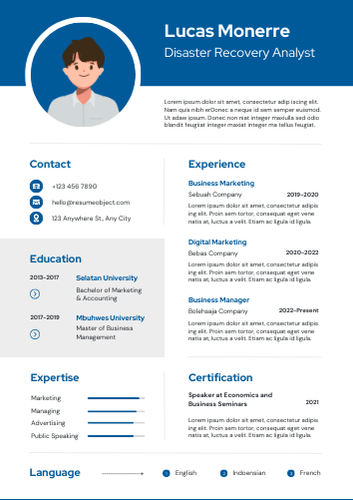
Disaster Recovery Analyst Resume
Objective
Detail-oriented Disaster Recovery Analyst with expertise in risk assessment and recovery planning, seeking to leverage analytical skills and technical knowledge to enhance organizational resilience and ensure business continuity.
Summary/Description
Detail-oriented Disaster Recovery Analyst with expertise in risk assessment, business continuity planning, and crisis management. Proven track record in developing strategies to minimize downtime and ensure organizational resilience.
Top Required Skills
Risk Assessment
Business Continuity Planning
Incident Response
Data Recovery Techniques
Communication Skills
Mistakes to Avoid
Failing to highlight relevant certifications and training in disaster recovery and business continuity.
Omitting specific examples of past disaster recovery planning and execution experiences.
Using generic language instead of industry-specific terminology and metrics to demonstrate impact.
Important Points to Add
Proficiency in disaster recovery planning and business continuity strategies
Experience with risk assessment and impact analysis
Knowledge of recovery tools and technologies (e.g., backup solutions, virtualization)
View More Templates
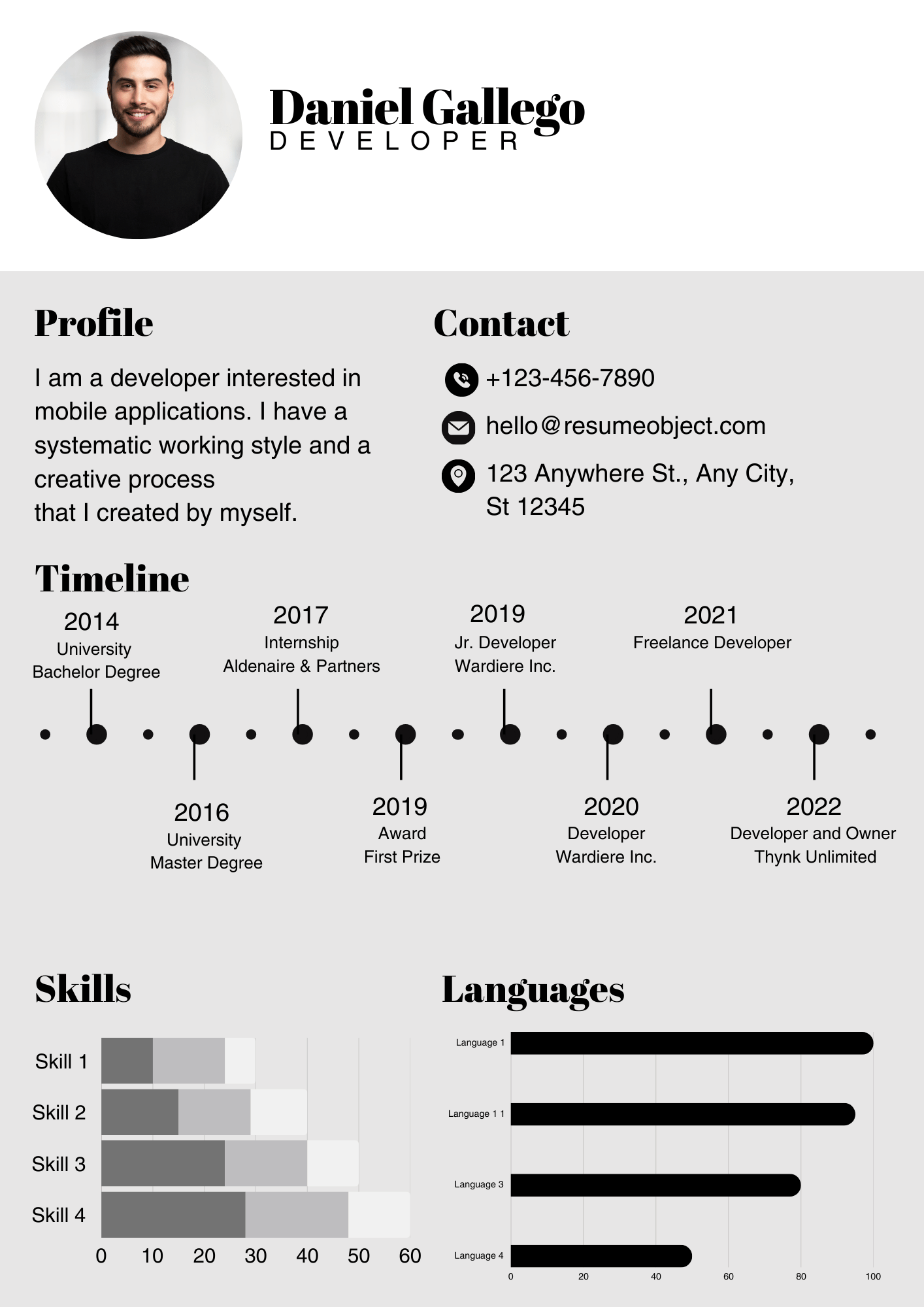 Free Resume Templates
Free Resume Templates

